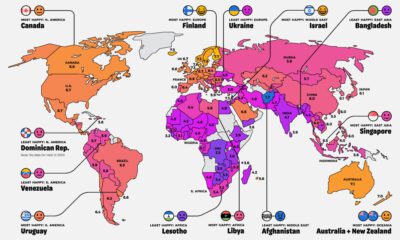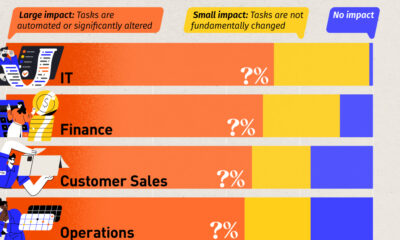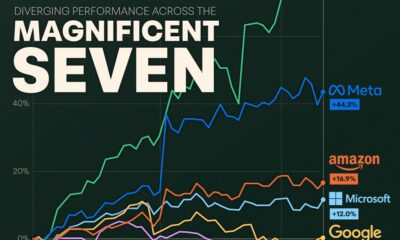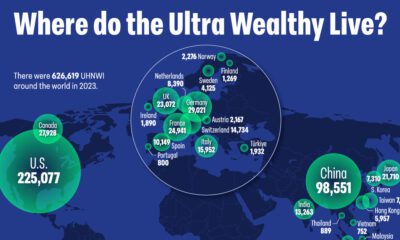Mapped: The Most Innovative Countries in the World in 2022
https://www.visualcapitalist.com/most-innovative-countries-2022/
December 15, 2022
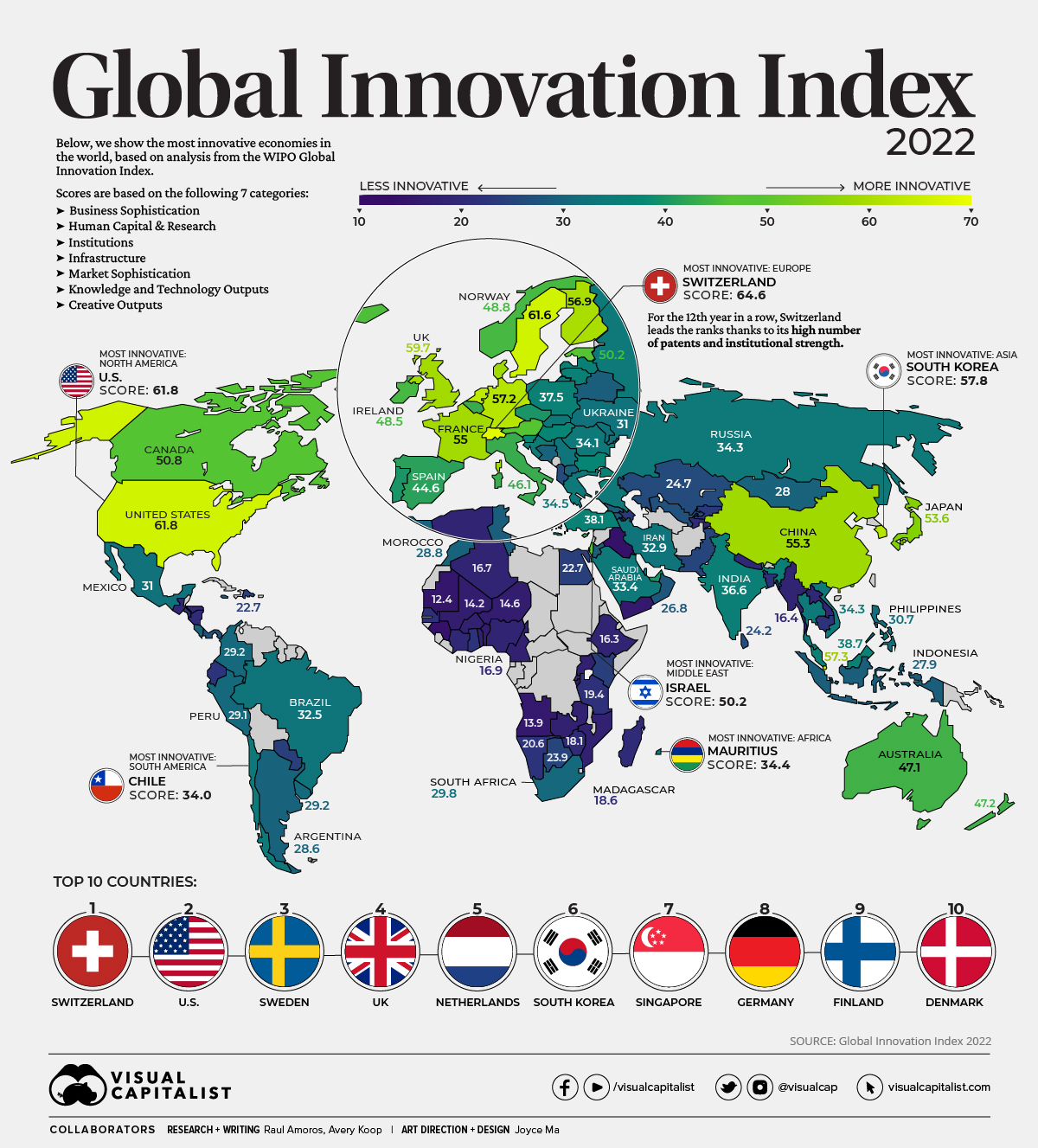
The Most Innovative Countries in the World 2022
Since 2000, global investment in research and development (R&D) has tripled to $2.4 trillion.
R&D spend is also casting a wider global net. In 1960, the U.S. made up nearly 70% of global R&D spending, and by 2020 this had fallen to 30%. From job creation and public health to national security and industrial competitiveness, R&D plays a vital role in a country’s economic growth and innovation, impacting nearly every corner of society—either directly or indirectly.
Along with R&D spend, other key ingredients play an important role in driving progress and innovation. These include technological adoption, scientific research, and venture capital activity, among others.
The above infographic ranks the world’s most innovative economies using data from the UN’s WIPO Global Innovation Index.
What Defines an Innovative Economy?
Innovation is inherently challenging to quantify, but the Global Innovation Index is a longstanding attempt to do just that.
The framework used for the index was designed to create a more complete analysis, comprising of 81 indicators across seven categories to calculate a country’s score:
| 7 Categories | Example Indicators |
|---|---|
 Business Sophistication Business Sophistication | Business R&D spend, net inflows of foreign direct investment |
 Market Sophistication Market Sophistication | Size of economy’s GDP, intensity of local market competition |
 Infrastructure Infrastructure | Road, hospital, school construction, energy efficiency |
 Human Capital & Research Human Capital & Research | Government funding per pupil, quality of scientific and research institutions |
 Institutions Institutions | Political stability and safety, ease of starting a business |
 Creative Outputs Creative Outputs | Most valuable brands, industrial design applications, trademark applications |
 Knowledge and Technology Outputs Knowledge and Technology Outputs | Patent applications, increase in labor productivity, spending on software |
As the above table shows, the framework aims to identify indicators that foster an innovative environment and breakthrough technologies.
It’s worth noting that each country’s overall innovation score is a mix of these categories, and countries with similar scores can be strong in different areas.
The 50 Most Innovative Countries in 2022
Switzerland ranks at the top? for the 12th year in a row—above the U.S., South Korea, and Israel.
For many, this may come as a surprise. However, the country’s intellectual property rules are considered world-class, and they are complemented by strong collaboration between universities and industry. In addition, the country attracts top talent thanks to its high quality of living.
At second is the United States, which is a top spender on R&D at over $700 billion per year. Globally, four of the five top R&D spending companies are in America: Amazon ($42.7 billion), Alphabet ($27.6 billion), Microsoft ($19.3 billion), and Apple ($18.8 billion).
| Rank | Country / Region | Score |
|---|---|---|
| 1 |  Switzerland Switzerland | 64.6 |
| 2 |  U.S. U.S. | 61.8 |
| 3 |  Sweden Sweden | 61.6 |
| 4 |  United Kingdom United Kingdom | 59.7 |
| 5 |  Netherlands Netherlands | 58.0 |
| 6 |  South Korea South Korea | 57.8 |
| 7 |  Singapore Singapore | 57.3 |
| 8 |  Germany Germany | 57.2 |
| 9 |  Finland Finland | 56.9 |
| 10 |  Denmark Denmark | 55.9 |
Countries across Europe also feature prominently in the top 10, including Sweden (#3), the United Kingdom (#4) and the Netherlands (#5).
South Korea (#6), is known for its high R&D intensity. This is driven by its industrial conglomerates, known as chaebols, that are generally family-owned. Samsung and LG are among its largest companies, known for their high degree of corporate-academic collaboration.
Below, we will take a closer look at the most innovative countries by region.
North America
In North America, the U.S. ranks highest. The country has long been known as a global leader in innovation, with a strong track record of introducing new ideas and technologies that have transformed the way we live and work. The U.S. ranks #1 in a number of indicators, including university-industry R&D collaboration and intangible asset intensity.
Ranking second in the region is Canada (Global rank: #15). Across all countries, it ranks first on measures of joint venture and strategic alliances per billion dollars of GDP (PPP) and number of venture capital (VC) recipients per billion dollars of GDP (PPP). In 2021, VC investment topped $14.7 billion across 752 deals.
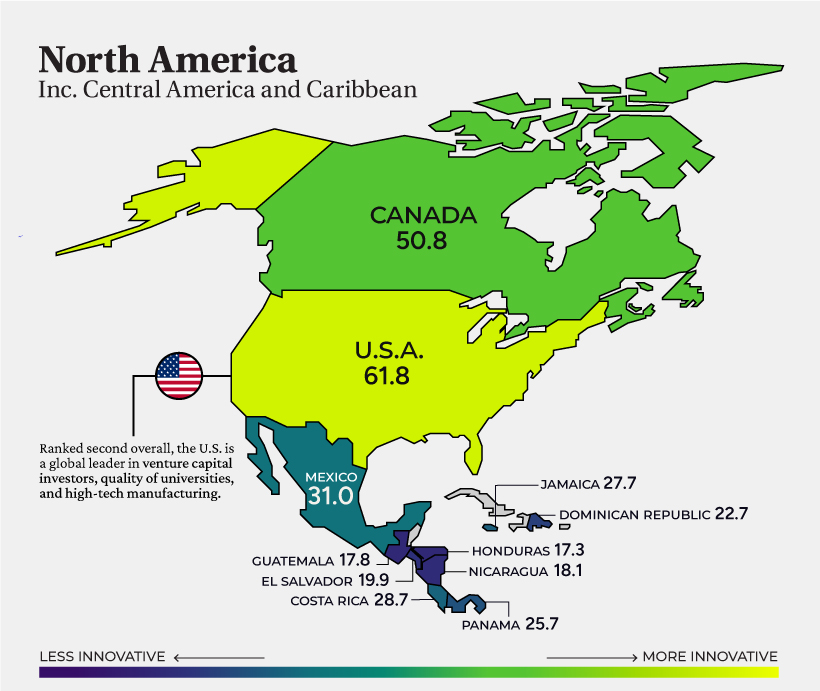
Another interesting example is Honduras (#113). Driving innovation in the country is a new economic zoning experiment called Zones for Economic Development and Employment (ZEDEs).
To date, these zones have attracted about a quarter of a billion dollars in private investment funding and have created thousands of new jobs.
South America
Chile (#50) ranks first across the region, thanks to its promising tech sector. To date, it is home to an estimated 8,000 tech companies. The country also has the highest scale of mobile connectivity in the region. In late 2021, it launched the first 5G network in South America.
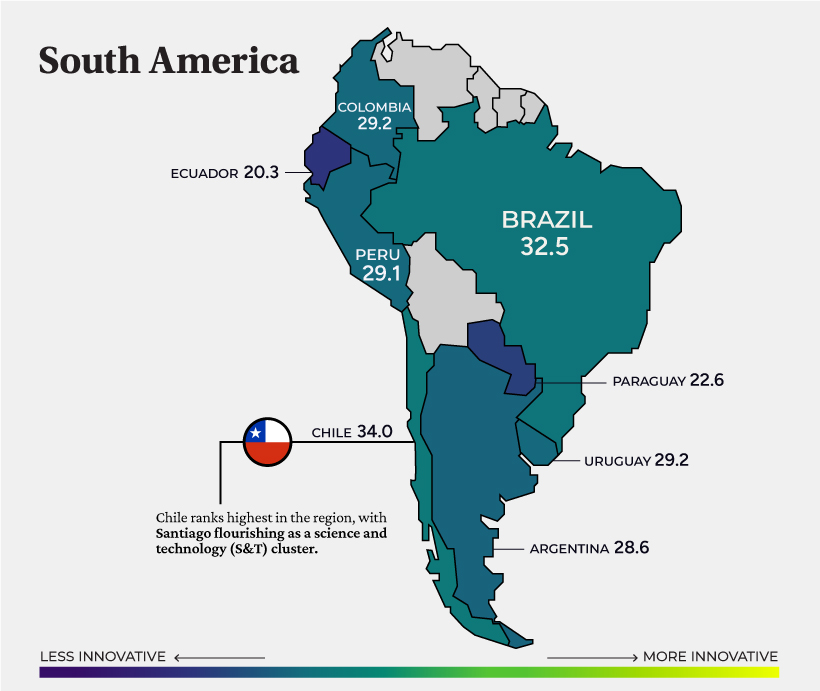
Following Chile is Brazil (#54), which saw a record number of IPOs in 2021 that were valued at nearly $7 billion.
Middle East and Central Asia
As the highest ranked in the region, Israel (#16) is the sole country globally that spends over 5% of GDP on R&D. Overall, it is a global leader in patent applications and information and communication technology (ICT) services exports.
For context, the country’s density of start-ups per capita is 16 times that of Europe.
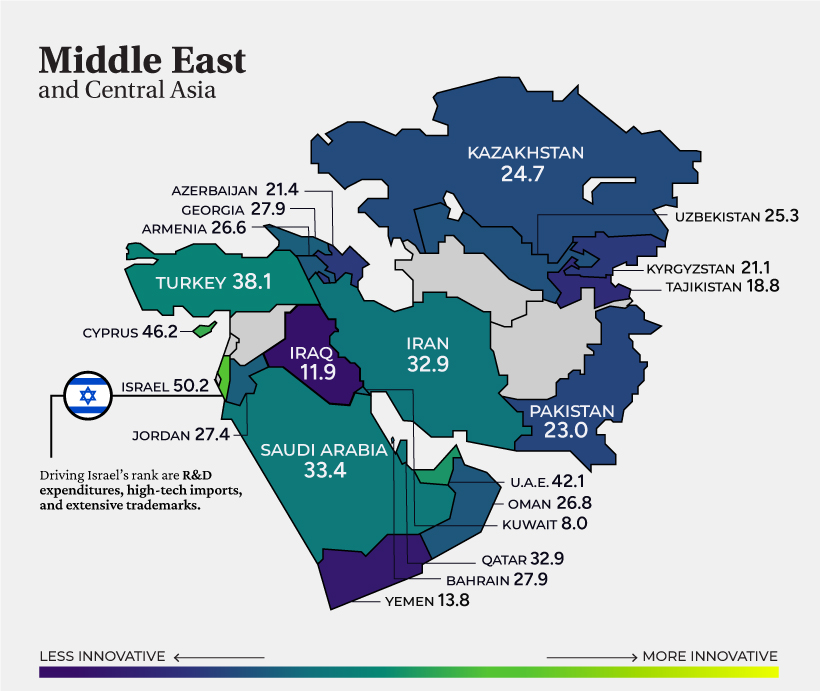
The small island nation of Cyprus (#27) follows in second, supported by government funding focused on start-ups. Meanwhile, Turkey (#37) in fourth, is home to six unicorns*, fostered by its development of a megatech corridor through Istanbul to Izmir.
*A unicorn is a privately-held startup that has a valuation of over $1 billion.
Europe
With 15 of the top 25 economies in the world, Europe is a powerhouse for fostering innovative ecosystems.
The continent is also a leader in social progress, equality, and life satisfaction. The region scores 30 on inequality according to the Gini Index compared to 41 for America.
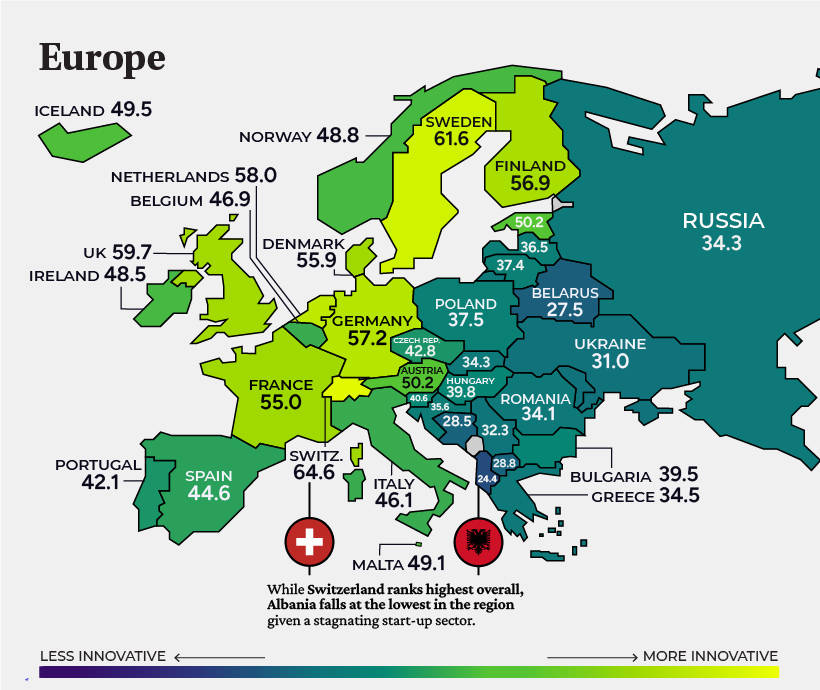
For many, technological output isn’t the first thing that comes to mind when they think of Europe, but VC deals surged over 53% in 2021. London, Berlin, and Paris were leading cities for VC activity.
East Asia and Oceania
South Korea (#6) ranks highest across East Asia and Oceania, and has established itself as a leader in technology and innovation on the global stage. Through its New Deal initiative, the government is spearheading projects on smart healthcare, AI, and smart industrial complexes. At the same time, it is accelerating the construction of eco-friendly infrastructure and renewable energy.
South Korea’s Hyundai and its subsidiary Kia have made considerable ground in electric vehicle (EV) production, comprising 9% of the U.S. EV market, the second-highest share after Tesla.
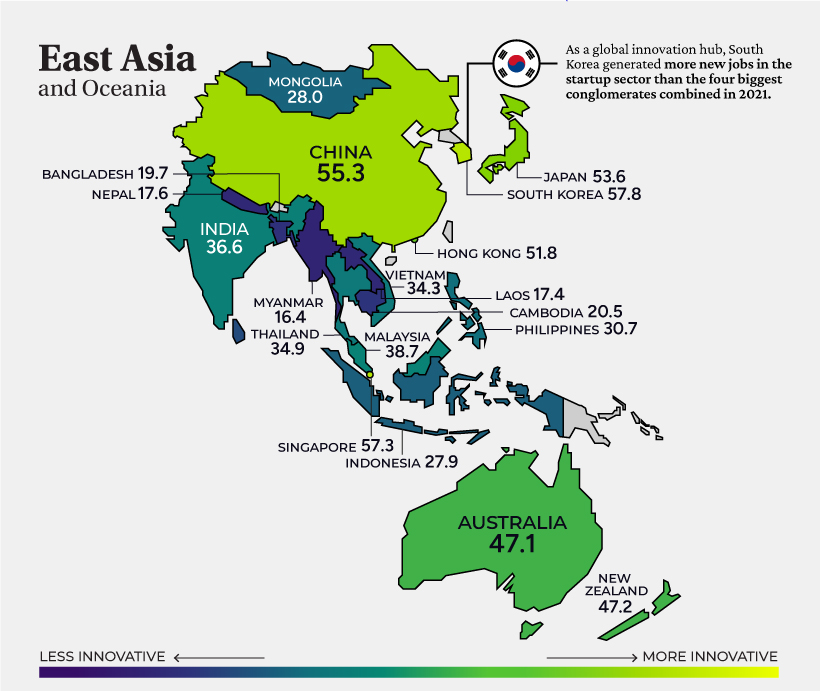
China sits just outside the global top 10, and now ranks #1 in multiple indicators, including labor productivity growth and trademarks by origin. China’s economic output per employed worker increased an impressive 4.2% annually from 2011 to 2019, on average.
Africa
The highest ranked in Africa is the island nation of Mauritius (#45).
Underscoring its rank is the strength of its institutions and market sophistication. Meanwhile, the government is accelerating investment in tech incubators, research-business collaboration, and tax incentives for R&D investment.
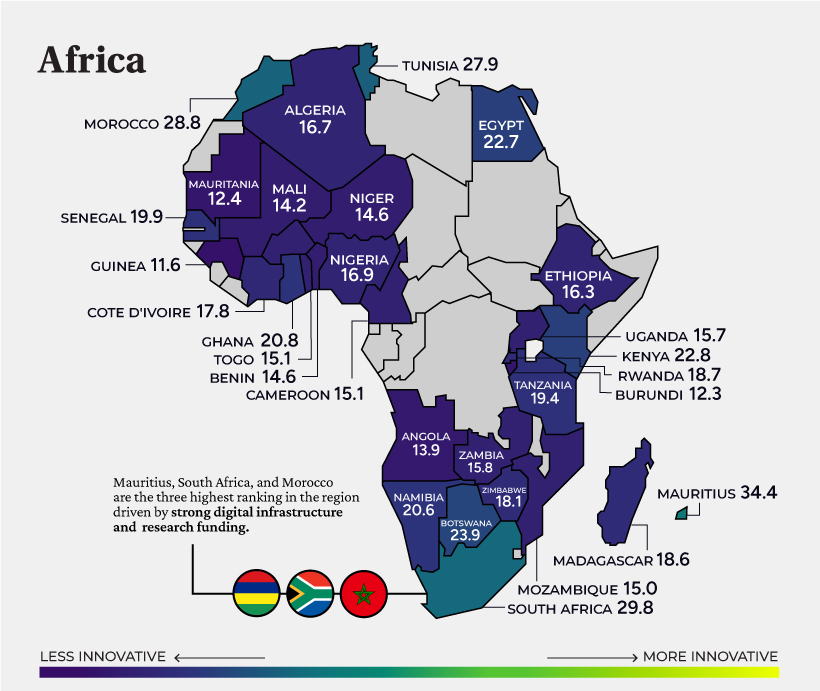
South Africa (#61) follows Mauritius on the list, with the city of Cape Town attracting a proposed $300 million Amazon headquarters.
Panasonic opened their headquarters in Cape Town in 2018. Oracle, IBM, Google, and Microsoft also have offices in the country’s expanding tech hub.
TECHNOLOGY
The World’s Biggest Cloud Computing Service Providers
Cloud computing service providers generated $270 billion in revenues last year, concentrated among a few giants.
Published
4 hours agoon
March 22, 2024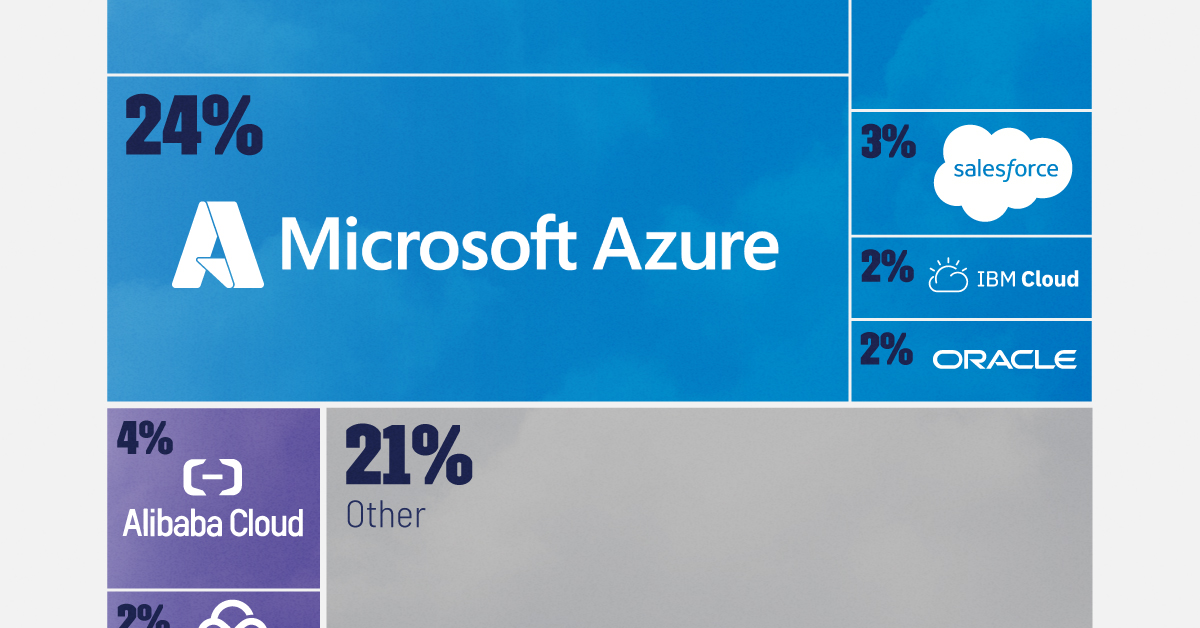
The World’s Biggest Cloud Computing Service Providers
This was originally posted on our Voronoi app. Download the app for free on iOS or Android and discover incredible data-driven charts from a variety of trusted sources.
Today, the three largest cloud computing service providers command 66% of the global market.
Amazon, Microsoft, and Google have generated billions in revenues through their cloud infrastructure that provide the computing power companies need to store data. What’s more, most AI models are run on the cloud, creating a surge in computing demand for cloud providers.
The above graphic shows the largest cloud providers globally, based on data from Synergy Research Group.
Breaking Down the Cloud Market
Here are the world’s top cloud computing service providers based on enterprise revenues as of the fourth quarter of 2023:
| Provider | Country | Market Share Q4 2023 |
|---|---|---|
| Amazon Web Services |  U.S. U.S. | 31% |
| Microsoft Azure |  U.S. U.S. | 24% |
| Google Cloud |  U.S. U.S. | 11% |
| Alibaba Cloud |  China China | 4% |
| Salesforce |  U.S. U.S. | 3% |
| IBM Cloud |  U.S. U.S. | 2% |
| Oracle |  U.S. U.S. | 2% |
| Tencent Cloud |  China China | 2% |
| Other |  Other Other | 21% |
With 31% of the global market share, Amazon’s cloud division posted $24.2 billion in revenues over the quarter.
AWS is a major cash engine for the company, but growth slowed over 2023 as enterprises and startups cut back on tech spending. Annual sales growth compared to the same quarter last year grew by 13%—far below competitors Microsoft and Google, whose cloud divisions grew by 30% and 26%, respectively.
As we can see, U.S. firms make up the lion’s share of the market, while China’s Alibaba Cloud and Tencent Cloud together comprise 5% of the global share.
The AI Boom and the Cloud
Given that a significant chunk of AI models are run on the cloud, the industry may be positioned to see greater demand as momentum accelerates.
In fact, newer AI systems are as much as 10 to 100 times larger than older models. In line with this, major cloud providers are seeing high demand for cloud services to allow companies across financial to manufacturing sectors to run large language models on their platforms.
Today, 98% of companies globally rely on the cloud for at least one part of their business applications, which may present a market opportunity for the industry as advancements in AI continue to grow.

